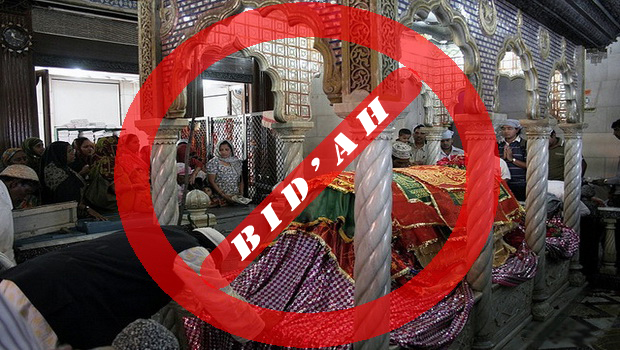Praise be to Allah.
Visiting graves to pray to their occupants or seek their help or ask them to intercede – this is a reprehensible action, and indeed it is major shirk. It is not permissible to build mosques or domes etc over graves, because the Messenger (peace and blessings of Allah be upon him) said: “May Allah curse the Jews and Christians, for they took the graves of their Prophets as places of worship.” (Sahih – agreed upon).
And because it was narrated from Jaabir (may Allah be pleased with him) in al-Sahih that the Prophet (peace and blessings of Allah be upon him) forbade plastering over graves, sitting on them and erecting structures over them. So it is not permissible to plaster over graves, perfume them, place screens around them or erect structures over them; all of that is forbidden and these are means that lead to shirk.
It is prescribed to visit graves in order to learn a lesson from that and to remember the Hereafter. That is subject to the condition that one does not say anything that will anger the Lord, such as calling upon the one who is buried or seeking his help instead of Allah, or praising him and saying that he is for certain in Paradise, etc.
The purpose of visiting the graves is two-fold
1) The visitor benefits from remembering death and the dead, remembering that their destiny will be either Paradise or Hell. This is the primary purpose of the visit.
2) The deceased also benefits and is treated kindly by the visitor greeting him with salaams, making du’a for him, praying for forgiveness for him. This applies only to Muslims. Among the du’as that may be recited are:
“Assalaamu ‘alaykum ahl al-diyaar min al-mu’mineen wa’l-Muslimeen, in sha’ Allah bikum laahiqoon, as’al Allaha lana wa lakum al-‘aafiyah.”
Meaning: “Peace be upon you O people of the dwellings, believers and Muslims, In sha’ Allah we will join you, I ask Allah to keep us and you safe and sound.”
It is permissible to raise the hands when reciting this du’a, because of the hadith of A’ishah who said: “The Messenger of Allah (peace and blessings of Allah be upon him) went out one night, and I sent Bareerah to follow him and see where he went. She said, ‘He went towards Baqi’ al-Gharqad [the graveyard in Madinah], and he stood at the bottom of al-Baqi’ and raised his hands, then he went away.’ Bareerah came back to me and told me, and when morning came I asked him about it. I said, ‘O Messenger of Allah, where did you go out to last night? He said, ‘I was sent to the people of al-Baqi’, to pray for them.’”
And we should not pray at graves because the Prophet (peace and blessings of Allah be upon him) said: “Those who came before you used to take the graves of their Prophets and righteous people as places of worship; do not take graves as places of worship, for I forbid you to do that.” (Narrated by Muslim in his Sahih from Jundub ibn ‘Abd-Allah al-Bajali (may Allah be pleased with him).
This hadith indicates that it is NOT permissible to pray at graves or to take them as Mosques; and because that is a means that leads to Shirk and worshiping someone other than Allah by calling upon them (the occupants of the graves), seeking their help, making vows to them, and touching the graves to seek their blessings.
Hence the Prophet (peace and blessings of Allah be upon him) warned against that. Rather graves should be visited in the manner prescribed in shari’ah only, to give salaams to them and make du’a for them and pray for mercy for them, but without traveling specifically for that purpose.
You should not walk between the graves of the Muslims wearing your shoes. It was narrated that ‘Uqbah ibn ‘Aamir (may Allah be pleased with him) said: “The Messenger of Allah (peace and blessings of Allah be upon him) said: ‘If I were to walk on hot coals or on a sword, or if I were to mend my shoes using my feet, that would be better for me than if I were to walk on the grave of a Muslim. And it makes no difference to me if I were to relieve myself in the midst of the graves or in the middle of the market-place [i.e., both are equally bad].’” (Narrated by Ibn Maajah, 1567)
With regard to reciting Quran when visiting the grave, this is something which has no basis in the Sunnah.
It is not prescribed in Islam, and the fact that it is not prescribed is supported by the hadith of the Prophet (peace and blessings of Allah be upon him): “Do not make your houses into graveyards, for the Shaytaan flees from a house in which Surah al-Baqarah is recited.” This was narrated by Muslim and al-Tirmidhi from the hadith of Abu Hurayrah.
This indicates that graves are NOT the place for reading Quran, hence the Prophet (peace and blessings of Allah be upon him) encouraged reading Quran in our houses and told us not to make them like graveyards where it is not read. Another hadith indicates that they (graveyards) are not the place for prayer (salaah) either. The Prophet (peace and blessings of Allah be upon him) said: “Pray in your houses and do not make them like graves.” This was narrated by Muslim and others from Ibn ‘Umar.
A similar report was narrated by al-Bukhari, who included it in a chapter entitled Baab Karaahat al-Salaah fi’l-Maqaabir (Chapter on it being disliked to pray in graveyards); thus he indicated that the hadith of Ibn ‘Umar could be understood to mean that it is makrooh to pray in graveyards. Similarly the hadith of Abu Hurayrah may be understood to mean that it is makrooh to read Quran in graveyards.
There is no difference between praying and reading Quran in this regard. Abu Dawood said in his Masaa’il (p. 158): “I heard Ahmad being asked about reading Quran at the graveside. He said, ‘No [that should not be done].’”
It is NOT prescribed in Islam to put “aas” leaves (a kind of tree) or fragrant herbs or roses on the grave, bukhoor (incense, incense sticks, etc), because this is not what the salaf did, and if it was good, they would have done it before us.
Ibn ‘Umar (may Allah be pleased with them both) said: “Every bid’ah (innovation) is a going astray, even if the people think it is good.” (Narrated by Ibn Battah in al-Ibaanah ‘an Usool al-Diyaanah, 2/112; al-Laakaa’i in al-Sunnah, 1/21, a mawqoof report with a sahih isnaad).
Ruling on women visiting graves
The correct view is that it is NOT allowed for women to visit graves, because of the hadith mentioned. It was narrated that the Prophet (peace and blessings of Allah be upon him) cursed women who visit graves. Women should stop visiting graves. The woman who visited a grave out of ignorance (of this ruling) is not to blame, but she should not do it again. If she does so, she has to repent and seek forgiveness, and repentance cancels out whatever came before.
Visiting graves is only for men. The Prophet (peace and blessings of Allah be upon him) said: “Visit graves, for they will remind you of the Hereafter.” At the beginning of Islam, visiting graves was not allowed for men and women alike, because the Muslims were new in Islam and came from a background where grave-worship and attachment to the dead were widespread. So they were forbidden to visit graves as a preventative measure, to avoid evil and prevent shirk. But once Islam was well-established and they understood Islam, Allah prescribed visiting the graves because of the lessons and reminders of death and the Hereafter involved in that, and so that they could make du’a for the deceased and pray for mercy for them. Then Allah forbade woman to do that because they may present a temptation to men and even to themselves, and because they have little patience and they get too upset. So by His mercy and kindness towards them, Allah forbade them to visit graves. This is also a form of kindness towards the men, because if they were all to gather at the grave, this might cause fitnah. So by His mercy, Allah forbade women to visit graves.
But with regard to the prayer (women praying the funeral prayer), there is nothing wrong with that. Women may join the funeral prayer. The prohibition applies only to visiting the graves. It was reported in al-Saheehayn that Umm Salamah (may Allah be pleased with her) said: “We were forbidden to follow the funeral procession but it was not made absolute on us.” (narrated by Muslim)
Women should not visit graves according to the more correct of the two scholarly opinions, because of the ahaadith which indicate that it is forbidden.
We ask Allah to bestow mercy upon the deceased Muslims. May Allah bless our Prophet Muhammad.
Sources:
Mukhtasar Ahkaam al-Janaa’iz by al-Albaani
Fataawa wa Maqaalaat Mutanawwi’ah li Samaahat al-Shaykh al-‘Allaamah ‘Abd al-‘Azeez ibn ‘Abd-Allah ibn Baaz (may Allah have mercy on him)
 navedz.com a muslim's Quest for the truth
navedz.com a muslim's Quest for the truth








Iam so pleased with explanation but my question is, what if the grave is near your farm area will it still be makruh for a woman to visit that grave?
@Mija
Visiting of any grave is prohibited for women, irrespective of where it is located. Also the Sunnah is to bury the dead in public graveyards.